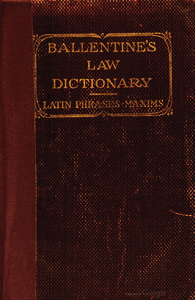A Roman law term denoting a pleader or advocate; the plaintiff in an action.
Definition of Actor
-
Ballentine's Law Dictionary
-
Black's Law Dictionary: 2nd Edition
In Roman law. One who acted for another; one who attended to another's business; a manager or agent. A slave who attended to, transacted or superintended his master's business or affairs, received and paid out moneys, and kept accounts. Burrill. A plaintiff or complainant. In a civil or private action the plaintiff was often called by the Romans "petitor;" in a public action (causa publica) he was called "accusator." The defendant was called "reus," both in private and public causes; this term, however, according to Cicero, (De Orat. ii. 43,) might signify either party, as indeed we might conclude from the word itself. In a private action, the defendant was often called "adversarius," but either party might be called so. Also, the term is used of a party who, for the time being, sustains the burden of proof, or has the initiative in the suit. In old European law. A proctor, advocate, or pleader; oue who acted for another in legal matters; one who represented a party and managed his cause. An attorney, bailiff, or steward; one who managed or acted for another. The Scotch "doer" is the literal translation. Actor qui contra regulam quid adduxit, non est andiendus. A plaintiff is not to be heard who has advanced anything against authority, (or against the rule.)

